The 2017 Trust Outlook: A Look at the Landscape and Impact of Trust from The Boardroom to the Living Room
December 21, 2016
"Right now in the U.S., a lack of trust is costing organizations billions of dollars each year. Regardless of size or industry, trust is a factor whose presence can lead to huge rewards but whose absence can mean devastating losses. This is the case both internally with employees and externally with customers because trust doesn't stay within the confines of one area of life or business. When corporate and business leaders understand and act on the importance of trust, how it is measured, and how it is built, they will reap tremendous benefits throughout their organizations. From bottom-line profits to employee retention, the business case is clear for this study, understanding, and building of trust. [...] Increased trust leads to better organizations and more trusted industries."
 Does trust really matter? The answer is unequivocally, yes, trust matters more than anything.
Does trust really matter? The answer is unequivocally, yes, trust matters more than anything.
Trust is a concept often considered in strictly emotional terms. And while there are numerous emotional elements to trust, this is a limiting framework for such an important aspect of life, leadership, influence, and performance.
Why? Because trust and its impact affect every area of life, whether work or personal. Building trust is vital for fully realizing one’s potential in any endeavor, from business, to leadership, to professional sports, to personal relationships. Trust impacts everything. Right now in the U.S., a lack of trust is costing organizations billions of dollars each year. Regardless of size or industry, trust is a factor whose presence can lead to huge rewards but whose absence can mean devastating losses. This is the case both internally with employees and externally with customers because trust doesn’t stay within the confines of one area of life or business.
When corporate and business leaders understand and act on the importance of trust, how it is measured, and how it is built, they will reap tremendous benefits throughout their organizations. From bottom-line profits to employee retention, the business case is clear for this study, understanding, and building of trust.
Increased trust leads to better organizations and more trusted industries. From the boardroom to the living room, it’s time we as a society and as leaders discover the startling impact of trust.
In this manifesto, we will be looking at how trust affects our business lives, our home lives, and our lives as citizens in a democracy.
TRUST IN THE BOARDROOM: A Business Case For Trust
Organizations Can Reap Huge Benefits When Employees Trust Leadership
Trust is vital to the operation of any organization. Team members who are unable to trust one another fail to perform at their highest potential. Employees who don’t trust their supervisors look for other work. And customers who don’t trust a company take their business elsewhere. It’s no secret that there are huge losses at stake with the absence of trust, but there is an equally impressive upside when it is present. An environment of trust, especially when it comes from the leadership level, permeates all parts of an organization and allows every individual to flourish. This is felt nowhere more deeply than inside an organization with the very people who make it run every day: its employees. Employees do more than just experience intangible “happy or satisfied” feelings when they trust the leadership of their organization. The national study found that this trust actually plays out in a variety of behaviors that are extremely beneficial to the
overall organization. And this is true across generations.
For example, 59% of Millennials said that they would be more loyal as an employee if they trust the leadership of an organization. Fifty-seven percent of Millennials say they would be a better team player, and 51% said they would work longer hours.
An organization with trustworthy leadership has the potential to increase retention and productivity with its youngest employees, the same ones with the longest work years ahead of them.
Leadership being trusted by employees is worth untold millions of dollars in recruiting, hiring, training, and productivity each and every year, making this alone a powerful business case for trust.
But it doesn’t just stop there. The research also found that millions of American workers from every generation would even be willing to take a pay cut to keep a company going if they trust the leadership. And, this remarkable finding wasn’t just among a sliver of the population.
In fact, 20% of Baby Boomers, 24% of Gen X, and 16% of Millennials say this is true.
RESEARCH FINDINGS
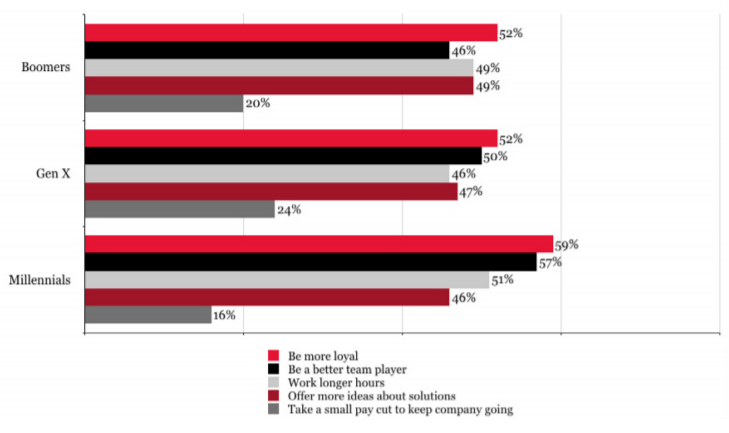
Open and Honest Communication Creates Big Wins
Since trust is not just a “nice-to-have” feature of company culture, but also an actual bottom-line element of a business structure, it becomes imperative that leaders understand how trust is built. The image of trusted leadership comes with many assumptions. For instance, it’s expected that leaders are competent, experienced, well trained, and able to do their jobs. And it’s natural to assume that this is largely where employees’ motivation to work hard and remain in their roles comes from.
But our national study found that while competency is indeed a strong motivator for employees to put forth their best effort, it isn’t at the top of the list. Instead, open and honest communication is the number one action that American workers say causes them to stay longer
with an employer and increase their performance at work.
An organization’s campaign to build trust clearly needs to start with communication to employees at every level, but what better place to start than with brand new employees? It’s important to start employees in the right direction, especially considering that many new employee decisions about whether to stay or go are often made right away.
What is missing from the new employer/employee relationship is trust, but this is only because it has yet to be built. While most organizations have a typical onboarding process, it may or may not be accomplishing the goal of quickly acclimating a new hire to the culture, environment, role, and expectations. And it may fall short of the immediate goal of building trust.
Our research shows that it is actually the small actions that drive trust with new employees. In fact, more than half of the American workforce believes that the fastest way to build trust is for a new employee to meet one-on-one with co-workers and their direct supervisor during
their first week on the job. Typical onboarding activities such as orientation, tours, or going to lunch are certainly important, but not as important as this simple trust-building gesture.
RESEARCH FINDINGS
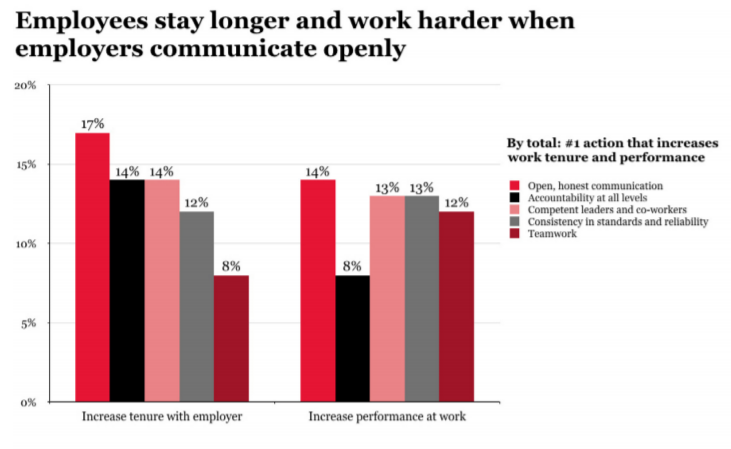
Trust Plays a Massive Role in the Sales Relationship
The classic stereotype of sales paints the experience as a slick pitch of half-truths from the salesperson to the unsuspecting customer. But, while this makes for a good cinematic story, the sales profession is built on trust and a salesperson worth his or her salt understands
that success will end quickly without this vital element.
Just how much weight does trust carry in a sales relationship? The national study found that 48% of America has invested more than $1,000 based purely on their trust of someone else. This investment wasn’t made because of a great product or opportunity or sales pitch, or even an emotional high. Nearly half of all adults have put hard earned money behind the motivation of trust.
More than $1,000 is a broad range of investment options and it could be assumed that most of these investments made purely on trust would huddle around the lowest dollar amount. But interestingly, the research found that the range of investments based solely off trust is
startling. In fact, the study revealed that more than 12 million Americans have invested more than $100,000 based purely on the trust they place in someone else.
RESEARCH FINDINGS
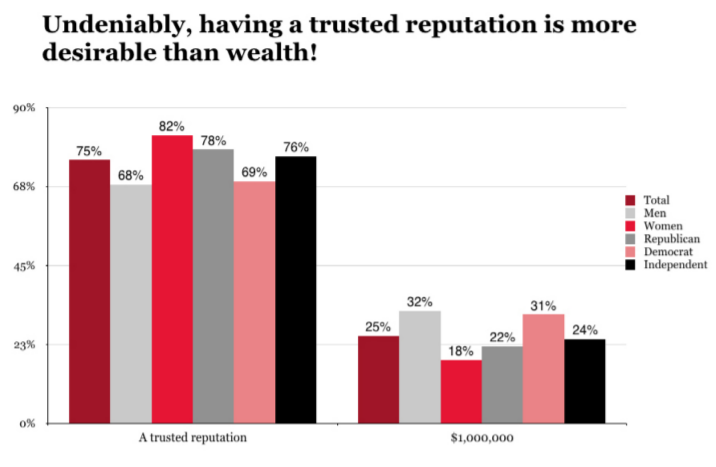
Since trust is indeed a vital component of the sales relationship, it behooves every sales professional and sales-based organization to become a student of trust. Millions of Americans are willing to invest money based on trust alone, making the business case for trust very compelling.
Customers Want Clarity More Than Anything Else
But if trust in the sales relationship is so important, how is it built?
This too is surprisingly straightforward. This study found that traditional sales tactics such as asking questions, taking notes, listening, and sharing references are not the most effective ways to build trust. In fact, when Americans were asked about the number one thing a salesperson can do to earn their trust the fastest, the top answer was clarity; a clear explanation. Consumers want salespeople to clearly explain the specifics about what is being sold, including all costs.
This clarity element is even more important than the salesperson having a thorough knowledge of the product or service. Consumers simply want to know what they are getting into, clearly, concisely, and simply. And a key element is to include an explanation of all costs associated with the purchase or investment.
This makes perfect sense because it comes back to the fastest way to earn trust with anyone, in sales or elsewhere, which is truthfulness. It’s no coincidence that truth and trust are so closely connected, because it’s impossible to have one without the other. In fact, our national study found that by a landslide, the fastest way to earn the trust of a new acquaintance is to tell the truth. Seems obvious, doesn’t it?
In order, here are the four top ways to earn the trust of someone you’ve just met:
➔ Telling the truth
➔ Owning mistakes and fixing them quickly
➔ Doing what is right over what is easy
➔ Keeping promises
RESEARCH FINDINGS
Trust Is a Vital Aspect of Healthcare
Trust matters deeply in all areas of business, from sales and finance to retail and services. It transcends company type, industry, and geography in its importance to the success and continuation of any organization because a business endeavor without trust is simply not sustainable.
But nowhere is trust more important than in the field of healthcare.
This makes sense, considering that people entrust the health, well-being, and sometimes the very lives of themselves and their loved ones to healthcare professionals. But even more than other industries, customers rely on trust to decide whom in the healthcare industry to hire. In fact, our national study found that 84% of consumers say trust is important in determining which healthcare professionals they decide to work with.
This reliance on trust is even truer for Baby Boomers, 89% of whom say trust is important in deciding whom in the healthcare professional they’ll work with, and for women, 88% say the same.
The success of healthcare professionals depends not just on smart business practices and a mastery of the skills necessary to care for patients, but also the ability to create, build, and foster trust.
TRUST IN THE LIVING ROOM
Trust Begins at Home
Although trust is highly important to nearly every life endeavor, it doesn’t just magically appear. People must learn about trust from somewhere and, like so many other significant things in life, learning about trust starts at home.
Parents, and in particular moms, take the cake as the primary teachers of trust. The national study found that 49% of people say their mom taught them the most about what trust means and 27% say this about their dads.
But learning about trust, even while it takes place at home, has an interesting gender breakdown. Men learn trust from their moms only slightly more than from their dads, while women are far more likely to learn about trust from their moms. Forty percent of men say they learned the most about trust from their moms while 35% say they learned the most from their dads. This is much different for women, 59% of whom say they learned the most about trust from their moms while only 18% say this about their dads.
RESEARCH FINDINGS
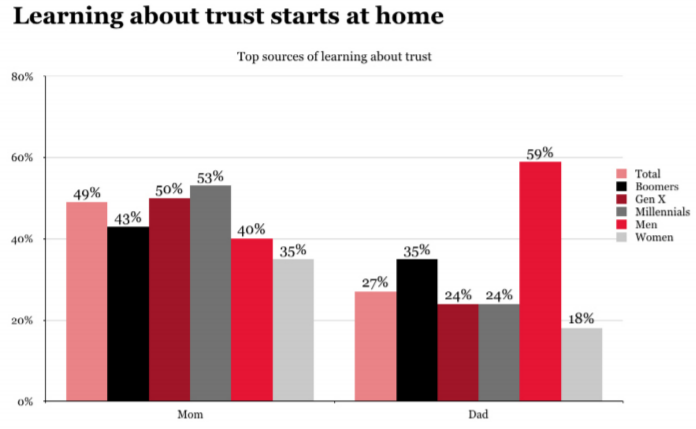
While the primary source of learning about trust may be mom or dad, the takeaway is the importance of parents and family in shaping a child’s view of trust. It’s no secret that the role of a parent is arguably the most powerful one in life, but when put in terms of shaping
another person’s views about trust, it becomes even weightier. Understanding and implementing trust is as important at home as it is in the workplace.
Trust Isn’t Built Arbitrarily
People learn the most about trust from their parents, but this doesn’t cause or necessarily influence trustworthy behavior. There still must be a catalyst for such behavior.
What most causes someone to become a person who can be trusted?
The national study found that 83% of America believes that having a moral compass helps them be a person others can trust. It turns out that the factor that most helps guide someone toward trustworthy behavior is having a standard for living that separates right and wrong. In other words, a system of beliefs and behavior guidelines that isn’t arbitrarily set by an individual is the framework that fosters trust and most inspires a person to become someone who can be trusted.
Much like the source of learning about trust, this concept of a moral compass as inspiring trustworthy behavior is one that happens away from the work setting yet has massive implications within it. It’s not uncommon to hear the claim that behavior in a work setting and behavior in a personal setting can be completely separate. But, the claim of the majority of Americans that a moral compass most helps them to be trustworthy disproves this notion. A moral compass doesn’t switch on and off like a light bulb, but is instead a steady undercurrent prompting trust to be exhibited as easily in the boardroom as it is in the living room, and vice versa.
TRUST AT THE BALLOT BOX
The American Political System Has a Trust Crisis
The overall health of our political system is often perceived in terms of measuring participation. Voting behavior, for example, has been a serious study of social scientists and a concern of leaders for decades, and there are a slew of theories about why participation is lagging.
An uninformed, uneducated, and unmotivated electorate tops the list of possible reasons. But what if the lack of participation is really just a symptom of an overarching trust crisis? There is a serious trust issue in the American political system today. Our national study found
that 88% of Americans think the political system is not fully trustworthy and fair. If only 12 out of every 100 Americans think they have a fair and trustworthy system, is it any wonder that so many choose to forgo the time-honored civic duty of casting a ballot?
Interestingly, this trust gap plays out notably by political party affiliation with Democrats being the most likely, and Republicans the least likely to believe we have a trustworthy system.
Believe the system is fair and trustworthy by party:
➔ Republicans 7%
➔ Independents 9%
➔ Democrats 19%
RESEARCH FINDINGS
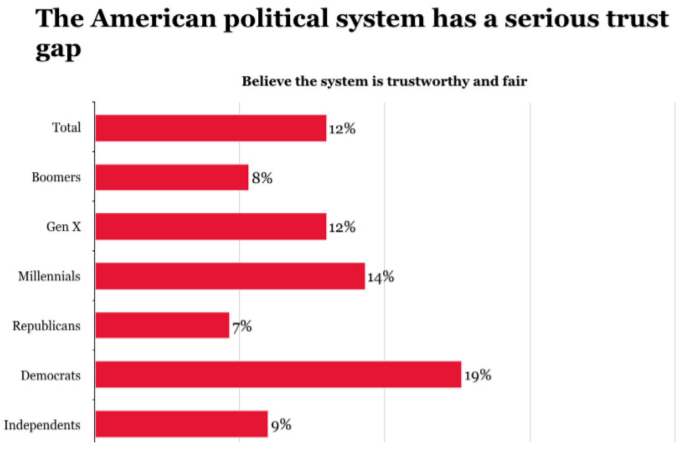
The Trust Crisis Isn’t Just With the Political System
There is clearly a trust gap in our political system but it turns out this isn’t the only element of the national civic domain that is failing to inspire the trust of the American public. The institution of government itself is woefully lacking in trust.
Republicans and Democrats may not agree on much these days, but we found that when it comes to trust and institutions, the parties actually have some common ground. They may not agree on which institutions are most trusted, but they absolutely agree on which are the least trusted.
The national study found that hands down, government and the entertainment industry are the institutions least trusted by Americans regardless of political affiliation. In fact, only 2% of both Republicans and Democrats and 0% of independents rate government as the institution they most trust. Only 1% of Republicans and Independents and 2% of Democrats rate the entertainment industry as the institution they most trust.
While it’s refreshing to have a shred of unity from the political parties, the implications of the distrust Americans have toward the political system and even the institution of government are distressing. For the health of our political system, trust must be understood and built by leaders not just in business and not just at home with families, but more certainly in the political sphere as well.
RESEARCH CONCLUSION AND TAKEAWAYS
The topic of trust is vast and multifaceted in its importance and implications for everything from business to personal lives to politics. Since trust is more than just a “nice-to-have” feature of company culture, leaders who value bottom-line impact and a trusted reputation must understand how trust is formed and learn how to build it.
The benefits of employees trusting the leadership of an organization are astounding and include everything from increased loyalty and productivity to better teamwork. The research reflected that, from day one, trust can and should be built with new employees through simple gestures, particularly having the employee meet face-to-face with colleagues and direct supervisors during their first week of work. This one action builds the most trust with new employees, even more than traditional onboarding activities such as orientation, tours, or first day lunches.
The study also revealed that trust in a sales environment is vital because many people have invested large sums of money based purely on trust. This serves to highlight the power of what trust can do on a smaller scale and when built over time. Trust can be built in a sales situation by providing a clear explanation of what is being sold including all costs. This is what consumers most want. The research also showed the importance of trust in the healthcare industry as the vast majority of consumers rely on trust as an important factor in helping them determine which professionals to work with.
Trust is just as important in business as it is in the home. In fact, the findings revealed that a parent, particularly mom, is where the majority of people learned the most about trust. But this study also found that having a moral compass is what most helps people to be a person others
can trust.
The importance of trust doesn’t stop with business or personal spheres, but spills over into the public realm as well. A lack of trust in public discourse and civic life can have a devastating effect on democracy. The American political system is experiencing a trust crisis where 9 out of 10 Americans don’t believe the system is fair and trustworthy—meaning not rigged. And government is tied with the entertainment industry as the least trusted institution in American life.
In summary, a lack of trust is costing millions of dollars each year, but there is a strong business case to measure trust, and a specific process for building it. Making this effort doesn’t just yield positive, bottom-line results, but also creates better places to work, and strengthens relationships both internally with an organization’s team and externally with its clients and customers.
Here are 3 strategies from this study for capitalizing on the benefits of trust within your organization:
1 | Build trust quickly with new employees. Even more than traditional onboarding activities like orientation and a tour, set up face-to-face meetings between the new employee and his or her colleagues and supervisor(s) on their first week of work. This does the most toward building trust between the new employee and the rest of the organization.
2 | Foster a culture of honest, open communication. This is the condition employees say is most likely to increase tenure and performance at work. Employees stay longer with an organization and work harder while there when employers communicate openly and honestly. This one adjustment has the potential to have astounding benefits both for an organization and its employees.
3 | Give your clients and customers clear explanations. A well-rehearsed sales pitch is great, as long as it’s clear, concise, and includes the exact particulars of cost. This type of explanation will do the most toward winning the trust of your customers, even if they are just meeting your organization for the very first time.

